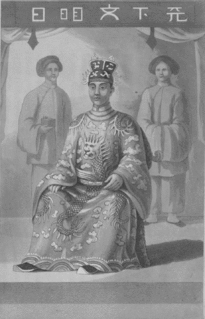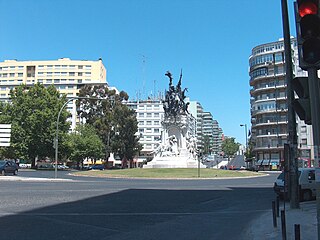The History of Malawi covers the area of present-day Malawi. The region was once part of the Maravi Empire. In colonial times, the territory was ruled by the British, under whose control it was known first as British Central Africa and later Nyasaland. It became part of the Federation of Rhodesia and Nyasaland. The country achieved full independence, as Malawi, in 1964. After independence, Malawi was ruled as a one-party state under Hastings Banda until 1994.

The Nguyễn dynasty was the last Vietnamese dynasty, which ruled the unified Vietnamese state largely independently from 1802 to 1884. During its existence, the empire expanded into modern-day southern Vietnam, Cambodia, and Laos through a continuation of the centuries-long Nam tiến and Siamese–Vietnamese wars. After 1883, the Nguyễn emperors ruled nominally as heads of state of the French protectorates of Annam and Tonkin until the final months of WWII; they later nominally ruled over the Empire of Vietnam until the Japanese surrender.

Wang Mang, courtesy name Jujun, was the founder and the only emperor of the short-lived Chinese Xin dynasty. He was originally an official and consort kin of the Han dynasty and later seized the throne in AD 9. The Han dynasty was restored after his overthrow, and his rule marked the separation between the Western Han dynasty and Eastern Han dynasty. Some historians have traditionally viewed Wang as a usurper, while others have portrayed him as a visionary and selfless social reformer. Though a learned Confucian scholar who sought to implement the harmonious society he saw in the classics, his efforts ended in chaos.

The Xin dynasty was a short-lived Chinese dynasty which lasted from 9 to 23 AD, established by the Han dynasty consort kin Wang Mang, who usurped the throne of Emperor Ping of Han and the infant "crown prince" Ruzi Ying to rule the empire over a decade before being overthrown by rebels. After Wang's death, the Han dynasty was restored by Liu Xiu, a distant descendant of the Emperor Jing of Han; therefore, the Xin dynasty is often considered an interregnum period of the Han dynasty, dividing it into the Western Han and the Eastern Han.

Minh Mạng or Minh Mệnh was the second emperor of the Nguyễn dynasty of Vietnam, reigning from 14 February 1820 until his death, on 20 January 1841. He was the fourth son of Emperor Gia Long, whose eldest son, Nguyễn Phúc Cảnh, had died in 1801. He was well known for his opposition to French involvement in Vietnam and his rigid Confucian orthodoxy.

Vĩnh Long is a province located in the Mekong Delta of southern Vietnam. Its capital is Vĩnh Long. Its population is 1,046,390 and its area is 1,475 square kilometres (570 sq mi). Vĩnh Long is a Sino-Vietnamese name, translating as "eternal prosperity." However, due to not understanding the meaning, Vinh Long was called "Vĩnh Dragon" by some young people.

Cecilia Manguerra Brainard is an author and editor of 20 books. She co-founded PAWWA or Philippine American Women Writers and Artists; and also founded Philippine American Literary House. Brainard's works include the World War II novel, When the Rainbow Goddess Wept, The Newspaper Widow, Magdalena, and Woman With Horns and Other Stories. She edited several anthologies including Fiction by Filipinos in America, Contemporary Fiction by Filipinos in America, and two volumes of Growing Up Filipino I and II, books used by educators.
The Masseur is a 2005 Filipino psychological drama film co-story and directed by Brillante Mendoza in his directorial debut. This film is about a young man who gives massages to gay men in Manila and had a relationship.

Praça de Entrecampos is a plaza in Lisbon, Portugal. "Entrecampos" means "between the fields" in Portuguese. Entrecampos is located between Campo Grande and Campo Pequeno.
Mang'u High School is a Kenyan Roman Catholic National High School established in 1925, located in Kiambu County along the Nairobi-Thika Highway six kilometres (3.7 mi) from Thika, Kenya. Mang'u High School is ranked among the top schools nationwide in Kenya Certificate of Secondary Education and has many eminent alumni including one Kenyan president, several vice presidents, Central Bank of Kenya governor and a former Cardinal.

Mang Yang is a district (huyện) of Gia Lai Province in the Central Highlands region of Vietnam.

Mang Inasal Philippines, Inc., also known as Mang Inasal, is a barbecue fast food restaurant chain in the Philippines, established in Iloilo City in 2003.
Datooga is a Nilotic language or dialect cluster of the Southern Nilotic group. It is spoken by the Datooga people of the Great Rift Valley of Tanzania. The Sukuma name Taturu is also sometimes used in English; the Swahili name Mang'ati comes from Maasai, where it means "enemy". However, it is not considered offensive to the Datooga, as there is a degree of pride in being the historic enemy of the Maasai, and Mang'ati has become the standard name for the group in Swahili. In addition, numerous tribal and dialectal names may be found for the people or language as a whole.

Lê Văn Duyệt was a Vietnamese general who helped Nguyễn Ánh—the future Emperor Gia Long—put down the Tây Sơn wars, unify Vietnam and establish the Nguyễn Dynasty. After the Nguyễn came to power in 1802, Duyệt became a high-ranking mandarin, serving under the first two Nguyễn emperors Gia Long and Minh Mạng.
Mumuye is by far the most populous of the Adamawa languages. It is spoken in northeastern Nigeria. It is classified in the Leko–Nimbari branch of Savanna languages, as Adamawa is no longer considered a valid family. According to Ethnologue, there are multiple dialects: Zinna, Rang (Lamma), Dong, Yoro, Lankaviri, Gola (Bajama), Gongla, Kasaa, Saawa, Jalingo, Nyaaja, Jeng, Gnoore, Yaa, Sagbee, Shaari, Kugong, Mang, Kwaji, Meeka, Yakoko.
Mün is a Kuki-Chin language of Burma. It is spoken in Mindat township, Chin State, and Saw and Tilin townships, both in Magway Region (Ethnologue).
Tyap is a regionally important dialect cluster of Plateau languages in Nigeria's Middle Belt, named after its prestige dialect. It is also known by its Hausa exonym as Katab or Kataf. It is also known by the names of its dialectical varieties including Sholyio (Morwa), Fantswam (Kafanchan), Gworok (Kagoro), Takad (Attakar), "Mabatado", Tyeca̱rak (Kacecere) and Tyuku (Tuku). According to Blench (2008), Jju—with more speakers—appears to be a form of Tyap.
Mang, or Mashan Miao also known as Mashan Hmong, is a Miao language of China, spoken primarily in Ziyun Miao and Buyei Autonomous County, southwestern Guizhou province, southwest China. The endonym is Mang, similar to other West Hmongic languages such as Mong.
Mang Gui Kiu is a bridge situated in Tsung Tsai Yuen (松仔園), Tai Po Kau, Tai Po District, New Territories, Hong Kong. It was originally named Hung Shui Kiu for being frequently overflown by heavy rains. In 1955, a group of teachers and students from St. James' Settlement died in an accident on a day of heavy rain. Ghost haunting stories related to the incident have continued in the area ever since.









